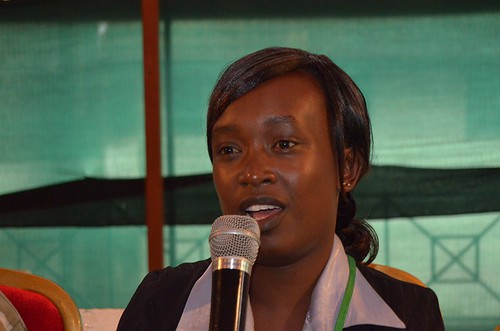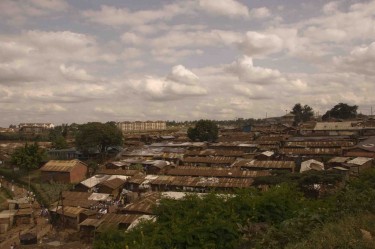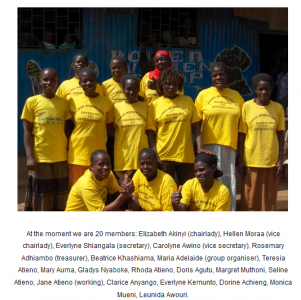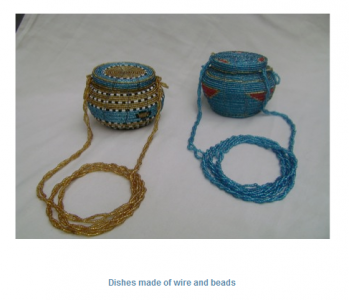This post is part of the joint citizen journalism initiative “Citizen Journalism with Map Kibera During GV Summit [1]“.
As part of the activities of the Global Voices Summit 2012 held in Nairobi last week, a visit [1] to the Kibera neighborhood was organized. Kibera is the second largest urban slum area in Africa [2] and its inhabitants are estimated to be more than one million people.
The MapKibera Trust [4] team warmly welcomed the members of the Global Voices Community who went to their office in two minibuses. Founded in 2009, the Trust worked on developing a map of Kibera outlining the different community resources and needs. The map also serves as an advocacy tool to highlight the main issues with the relevant stakeholders and to improve the situation of the Kibera community.
Kibera in Nairobi, Kenya, was a blank spot on the map until November 2009, when young Kiberans created the first free and open digital map of their own community. Map Kibera has now grown into a complete interactive community information project.
Getting to Kibera
After a brief presentation of MapKibera and the related projects Voice of Kibera [5] and Kibera News Network [6], we went for field work. Based on the discussion with the team, Global Voices volunteers chose four main topics of interest: Education, Women and sexual health/HIV, Digital literacy and Election preparedness. The Kibera team volunteered to guide us in our journey to explore those topics and the relevant initiatives in the community. We were very interested into getting in touch with people working to raise awareness about sexual health. Our guide Lucy thus introduced us to the Power Women group.

Lucy, our tour guide. Photo by Rezwan (CC-BY)
Introducing the Power Women
As they define [7] themselves:
The Powerwomen are a group of twenty women who came together to reduce poverty in the community. The group chose the name “power”, meaning strength. “nguru” is a Swahili word for power. Some of the reasons for coming together was to reduce stigma in the community.
They welcomed us in their Power Women Shop. As we entered the shop, we met Elizabeth (the chairlady of the group) and Rosemary (the treasurer). Their history starts back in 2004 when a few HIV-positive women suffering from the discrimination gathered searching for a way to change their situation. They told us their inspiring story.
In the beginning, each one of the women was saving 10 Kenyan shillings (KSH) per meeting. With two meetings per week, the group quickly collected 3,000 KSH and could start crafting HIV/AIDS pins. They started reaching out to the community and distributing those pins for free to raise awareness of HIV/AIDS and break the silence and stigma of the disease. Later, they thought of making their initiative more sustainable by kicking off their own business: the Power Women Shop. At the shop, the women sell [9] some handmade jewels made of beads and cow bones as well as bags made out of recycled materials.
The Power Women group created a system to organize and sustain their resources, which is tightly linked to their daily livelihoods and challenges. As most of the women have other jobs, they have distributed their shifts at the shop according to their availability to ensure the presence of two women every day.
The monthly income from the shop is divided into four parts. The first part goes to purchase of the raw materials they need for creating their products. The second part goes to providing food for the women during their shifts. As HIV-positive people are more vulnerable to infections, the third part goes to emergency cases whenever the health of any of the women becomes seriously compromised. The fourth part goes to providing salaries for the women’s work at the shop.
What change did Power Women bring to the community?
The women said they have been challenging the stereotypes of living with HIV/AIDS in the community. By giving a living example of survival and perseverance, the negative attitudes started to evolve: more people are willing to interact with them and know more about HIV/AIDS.
Elizabeth told us that more and more people take detection tests and learn more about their sexual health. Also, the income from the shop enables the women from the group to look after orphaned children. These are often abandoned by their healthy relatives when their parents die of AIDS. A lot of people from the Kibera community are turning to the Power Women for help and advice on their daily problems as they witness an example of resilience in them.
However, the women still face different challenges. One of the main ones is resistance particularly from the men in the community to be engaged on HIV/AIDS issues. Despite the challenges, the women are determined to continue their efforts to fight the stigma. They shared with us their plans to expand their work and add ten more women to the group. Power Women's determination to carry on with their message is a true testament to where their name comes from.


